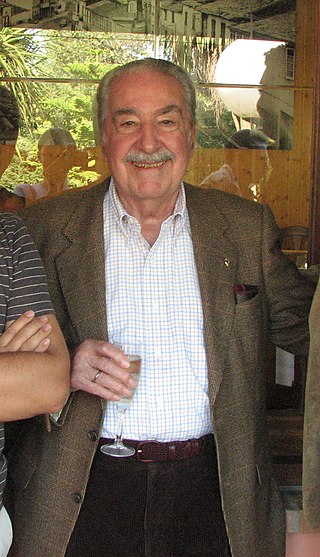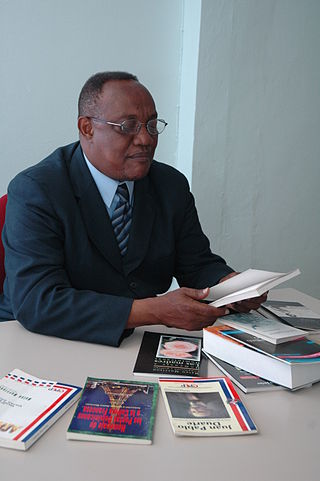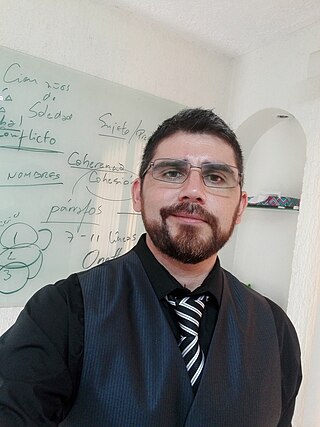Related Research Articles

Álvaro Mutis Jaramillo was a Colombian poet, novelist, and essayist. His best-known work is the novel sequence The Adventures and Misadventures of Maqroll, which revolves around the character of Maqroll el Gaviero. He won the 1991 International Nonino Prize in Italy. He was awarded the 2001 Miguel de Cervantes Prize and the 2002 Neustadt International Prize for Literature.

Gaucho literature, also known as gauchesco ("gauchoesque") genre was a literary movement purporting to use the language of the gauchos, comparable to the American cowboy, and reflecting their mentality. Although earlier works have been identified as gauchoesque, the movement particularly thrived from the 1870s to 1920s in Argentina, Uruguay and southern Brazil after which the movement petered out, although some works continued to be written. Gauchoesque works continue to be read and studied as a significant part of Argentine literary history.

Latin American literature consists of the oral and written literature of Latin America in several languages, particularly in Spanish, Portuguese, and the indigenous languages of the Americas. It rose to particular prominence globally during the second half of the 20th century, largely due to the international success of the style known as magical realism. As such, the region's literature is often associated solely with this style, with the 20th century literary movement known as Latin American Boom, and with its most famous exponent, Gabriel García Márquez. Latin American literature has a rich and complex tradition of literary production that dates back many centuries.

Mateo Morrison Fortunato is a Dominican writer, lawyer, poet and essayist. He won the Premio Nacional de Literatura of the Dominican Republic in 2010.

Adriano González León was a Venezuelan writer who is known in his country for the novel País Portátil (1968), widely regarded as the premier Venezuelan novel of the latter half of the 20th century, and for his many years of hosting a television program dedicated to promoting literary appreciation among the general public.

Fernando Cabrera is a Dominican-American poet, essayist, visual artist, songwriter and professor. He is a National Poetry and Literary Essay Prize Winner.

Eugenio Montejo was a Venezuelan poet and essay writer, founder of the literary magazine Azar and co-founder of Revista Poesía, a poetry magazine published by the University of Carabobo.
Consuelo Hernández is a Colombian American poet, scholar, literary critic and associate professor of Latin American studies at American University since 1995.
Odón Betanzos Palacios was a Spanish poet, novelist, literary critic and professor, based in New York from 1956 until his death in 2007. Odón Betanzos was also a tenured member of the Academia Norteamericana de la Lengua Española, of which was a Director and Corresponding Member of the Royal Spanish Academy, the Guatemalan, Filipino, Chilean, Colombian and Nicaraguan Language and the Hispanic Society of America. Moreover, he was president of the Hispanic Cultural Foundation in the United States and was in possession of the Commandery of the Order of Isabel the Catholic and the Civil Merit in the degree of Number granted by the King of Spain. He also received the Silver Medal of Andalusia in 1989, Freedom Prize of the City of New York (1986), Vasconcelos Award (Mexico-1990) for his work of creation and Medal of Christopher Columbus from the Dominican Republic (1991) Also, the rocianero writer gave his name to a foundation and an International Poetry Competition – the second largest in the province of Huelva, after Juan Ramon Jimenez-. He was also presidente del Círculo de Escritores y Poetas Iberoamericanos (C.W.P.L.)

Luis Britto García is a Venezuelan writer, playwright and essayist. His fiction has been recognised twice with the Casa de Las Américas Prize, for his works Rajatabla (1970) and Abrapalabra (1979). In 2002, he was the winner of Venezuela's National Prize for Literature, given as a lifetime achievement award. In 2005 he was recognized with the Ezequiel Martínez Estrada honorary award of Casa de Las Américas. In May 2012, he was appointed by President Hugo Chávez to the Venezuelan Council of State, "the highest circle of advisers to the president" provided for in the Venezuelan Constitution.

Iris M. Zavala was a Puerto Rican author, scholar, and poet, who later lived in Barcelona, Spain. She had over 50 works to her name, plus hundreds of articles, dissertations, and conferences and many of her writings, including "Nocturna, mas no funesta", build on and express this belief.

Juan Carlos Méndez Guédez is a Venezuelan writer. From an early age, he and his family moved to Caracas, where he lived in the popular area of Los Jardines del Valle, but always kept a close connection with his native hometown. He earned a Bachelor of Arts from the Central University of Venezuela with a thesis on poetry groups "Traffic" and "Guaire". Later, he earned a Ph.D. in Hispanic American Literature from the University of Salamanca with a thesis on the Venezuelan writer José Balza.

Jael Uribe Elizabeth Medina is best known as Jael Uribe is a writer, storyteller, poet and painter creator of the female poetic foundation named Women Poets International. She is considered the initiator of the Woman Scream International Poetry and Arts Festival, a chain of events celebrated by poets, artists and cultural associations worldwide, to honor women and against women violence during the month of march.

Carlos Augusto León Arocha was a Venezuelan poet, essayist, historian, politician and scientist.
Luis Pérez-Oramas is a Venezuelan/American poet, art historian and curator. He is the author of eleven poetry books, seven recollections of essays, and numerous art exhibition catalogs. He has contributed as Op-Ed author to national newspapers in Venezuela as well as to various literary and art magazines in Latin America and Europe.

Sonia Chocrón is a Venezuelan poet, novelist, screenwriter and playwright of Sephardic origin. She is related to the Venezuelan dramatist Isaac Chocrón.
Luis José Silva Michelena, best known as Ludovico Silva (1937–1988) was a Venezuelan poet and philosopher. A Marxist philosopher, he developed an account of ideology as symbolic surplus.

Keila Vall de la Ville is a Venezuelan author living in the United States. She is the author the 2016 novel Los días animales (2016) which received the International Latino Book Awards for Best Novel in 2018 and has been translated into English as The Animal Days (2021). Vall de la Ville's 2007 short story collection Ana no duerme (2007) was finalist in Venezuela's Concurso Nacional de Autores Inéditos. She has published the poetry book Viaje legado (2016), the short story collection Ana no duerme y otros cuentos (2016) and has edited the forthcoming anthology Between the Breath and the Abyss: Poetics on Beauty, a compilation of essays and poems by thirty-three contemporary poets on the subject of Beauty. Her fiction and non-fiction work is included in several anthologies. She collaborates with El Nacional's Papel Literario del Diario El Nacional, Viceversa Magazine and Prodavinci, among other digital media.

Ramón Mauricio González Gutiérrez, known by his pen name José Baroja, is a Chilean writer, academic and editor. He is a member of the Poets of the World Movement, representative of the Neofantastic Short-story and the new Chilean narrative.

Yolanda Pantin is a Venezuelan author who has mainly written poetry, although she has also worked in children's literature.